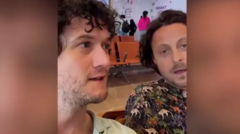In light of his recent ascension to the papacy, investigations into Leo XIV's past as Bishop Robert Prevost in Peru showcase contrasting approaches to handling sex abuse cases, raising questions about the future of the Church.
Pope Leo XIV's Complex Record on Sex Abuse: A Thorny Path for the Vatican

Pope Leo XIV's Complex Record on Sex Abuse: A Thorny Path for the Vatican
With the papacy of Leo XIV at a crossroads, scrutiny of his track record on abuse cases reveals both courageous advocacy and troubling failures.
In recent years, the Catholic Church has faced immense scrutiny over numerous sex abuse scandals involving clergy members worldwide, with accusations often encompassing a range of offenses against minors and vulnerable individuals. As the newly elected Pope Leo XIV leads the Church, navigating the complexities of his response to these allegations has become crucial in rebuilding trust among the global Catholic community, which numbers approximately 1.4 billion adherents.
To gain insight into how Pope Leo XIV might approach issues of sexual misconduct within the Church, a detailed investigation by a team of journalists has examined his handling of two specific abuse cases during his tenure as Bishop of Chiclayo, Peru, from 2015 to 2023. The findings reveal a stark dichotomy in his actions: in one instance, Bishop Prevost demonstrated a commendable commitment to supporting victims, confronting influential Church figures to advocate for justice over the abuses conducted by Sodalitium Christianae Vitae, a deeply problematic Catholic movement notorious for exploiting and abusing children from affluent families.
Conversely, his handling of another case raises serious concerns. Critics argue that he failed to investigate claims brought forth by three women who alleged childhood abuse at the hands of priests. Disturbingly, reports indicate that during the time of his bishopric, at least two priests accused of sexual abuse continued their activities within parish settings, potentially exposing more children to harm. Additionally, a priest appointed by Prevost to assist victims allegedly cautioned them that their cases might not warrant accountability, suggesting that the severity of their experiences did not rise to a level that the Church would address.
As Pope Leo XIV steps into one of the most pivotal periods for the Catholic Church, his past decisions—marked by both effective advocacy and apparent negligence—will undoubtedly influence how he shapes the institution's future approach to handling sexual abuse claims and restoring faith among its followers. The diverse responses he exhibited during his time as bishop could either serve as a foundation for reform or present challenges that may hinder the Church's quest for healing and accountability.
To gain insight into how Pope Leo XIV might approach issues of sexual misconduct within the Church, a detailed investigation by a team of journalists has examined his handling of two specific abuse cases during his tenure as Bishop of Chiclayo, Peru, from 2015 to 2023. The findings reveal a stark dichotomy in his actions: in one instance, Bishop Prevost demonstrated a commendable commitment to supporting victims, confronting influential Church figures to advocate for justice over the abuses conducted by Sodalitium Christianae Vitae, a deeply problematic Catholic movement notorious for exploiting and abusing children from affluent families.
Conversely, his handling of another case raises serious concerns. Critics argue that he failed to investigate claims brought forth by three women who alleged childhood abuse at the hands of priests. Disturbingly, reports indicate that during the time of his bishopric, at least two priests accused of sexual abuse continued their activities within parish settings, potentially exposing more children to harm. Additionally, a priest appointed by Prevost to assist victims allegedly cautioned them that their cases might not warrant accountability, suggesting that the severity of their experiences did not rise to a level that the Church would address.
As Pope Leo XIV steps into one of the most pivotal periods for the Catholic Church, his past decisions—marked by both effective advocacy and apparent negligence—will undoubtedly influence how he shapes the institution's future approach to handling sexual abuse claims and restoring faith among its followers. The diverse responses he exhibited during his time as bishop could either serve as a foundation for reform or present challenges that may hinder the Church's quest for healing and accountability.




















